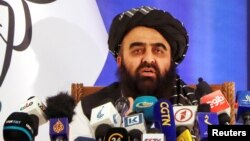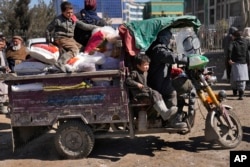The chief diplomat of Afghanistan’s Taliban government alleged Tuesday while addressing an international conference in neighboring Uzbekistan that sanctions imposed by the United States are a main driver of poverty in his war-ravaged country.
Foreign Minister Amir Khan Muttaqi urged Washington again to lift the curbs and “unconditionally” release some $7 billion in frozen Afghan central bank funds held in the U.S. to enable the Taliban to deal with the country’s deepening economic and humanitarian crises. Another $2 billion in Afghan reserves have been held in European countries.
“These actions have not only hampered foreign investment and financial transactions, but also impacted government activities which purely benefit the general public,” Muttaqi stated at the event in the Uzbek capital, Tashkent.
He described unfreezing of Afghan reserves and removal of sanctions as “a fundamental step towards normalization of relations” between Kabul and Washington.
U.S. President Joe Biden issued an executive order in February aimed at unfreezing half of the $7 billion for humanitarian aid to benefit the Afghan people. The rest would be held for ongoing terrorism-related lawsuits in U.S. courts against the Taliban.
Washington says it is “working to help find an appropriate mechanism that can serve as a steward of the $3.5 billion that President Biden set aside.” The Taliban have demanded the entire sum be released, saying the money belongs to Afghanistan.
Reports said Tuesday that U.S. and Taliban officials had exchanged proposals for the release of the Afghan reserves into a trust fund, hinting at progress in the ongoing dialogue between the former adversaries.
“The problem is that the Taliban are still on the U.S. sanctions list,” noted Torek Farhadi, a former Afghan official and political commentator.
The Taliban retook power last August when the Western-backed government in Kabul collapsed and all U.S.-led foreign troops abruptly withdrew from the country after nearly 20 years of war with the group.
The surprising insurgent takeover prompted Washington and other donor countries to swiftly suspend financial assistance for the mostly aid-dependent South Asian nation, isolate the Afghan banking sector and strictly enforce long-running sanctions on dozens of members in the male-only Taliban government.
Uzbekistan hosted the conference to discuss ways for the global community to provide urgent humanitarian aid and facilitate economic reconstruction in Afghanistan, ravaged by years of war and persistent drought.
"Unfreezing of financial assets of Afghanistan abroad is one of the main factors in economic reconstruction of Afghanistan," state-run media quoted Uzbek Foreign Minister Vladimir Norov as telling Tuesday’s conference.
Uzbek officials said more than 100 participants from 20 countries including China, Iran, Pakistan, Russia, and the U.S., and representatives from the European Union, United Nations, and the 57-nation Islamic bloc known as the Organization of Islamic Cooperation, attended the conference.
Thomas West, the special representative for Afghanistan, led the U.S. delegation.
Women's rights and human rights
Rina Amiri, the special envoy for Afghan women, girls, and human rights, accompanied him.
“The international community is committed to a stable, peaceful, and inclusive Afghanistan that respects the human rights and fundamental freedoms of all Afghans, including women and ethnic and religious communities, and that prevents terrorist threats from Afghan soil,” the U.S. State Department said Monday.
The international community wants the group to improve its record on women's and other rights before officially recognizing the Taliban regime.
The hardline group has significantly rolled back women’s rights to work and education, barring most teenage girls from resuming secondary school in breach of public pledges not to do so. Women employed in the public sector have been told to stay at home, with the exception of those who work for the ministries of education, health and a few others and must use face coverings in public.
The Taliban defend their policies as in line with Afghan culture and Shariah or Islamic law.
Humanitarian emergencies
The U.N. lists Afghanistan among the world's largest humanitarian emergencies, estimating that 18.9 million people - nearly half of the population - could be acutely food insecure between June and November 2022.
“We stand ready to establish positive relations with all world countries in the framework of mutual respect and legitimate bilateral interests,” Muttaqi said in his address Tuesday.
“We also call on other world countries to begin official engagement with the Islamic Emirate of Afghanistan to secure long-term legitimate bilateral interests.”
The Taliban foreign minister renewed Kabul’s assurances that no individual or group would be allowed to use Afghan soil for attacks against any country.
He stated that his government was also effectively pursuing political reconciliation with former Afghan political and military officials, saying a number of them have already returned from self-imposed exile in recent weeks.
“Similarly, women continue to work in education, health and other government departments in a reassuring atmosphere. In some areas where a proper environment has not yet been established, women are getting paid salaries in their homes,” Muttaqi said.
Critics remain skeptical.
The U.N. women's agency representative in Afghanistan said Monday that the rollback on women's rights is an "alarm bell" to the world that shows how decades of progress can be wiped away in months.
Alison Davidian, from U.N. Women, spoke to reporters at U.N. headquarters in New York via a video link from Kabul.
Washington said Monday the Tashkent conference would be followed by direct talks between Taliban and U.S. delegates scheduled for Wednesday “to address the economic challenges faced by the Afghan people.”
Brian Nelson, the Treasury Department’s under secretary for terrorism and financial intelligence, would join Thomas West for the meeting in Tashkent, according to a department statement issued Monday.
VOA's Margaret Besheer contributed to this story.





